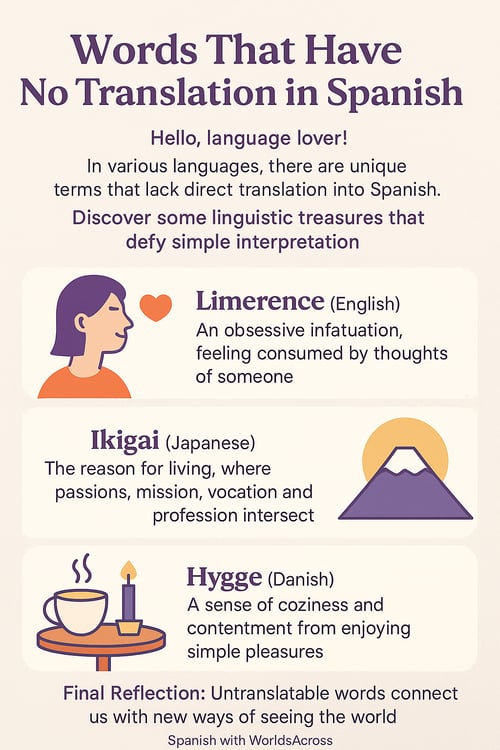Words that have no translation in Spanish
Hello, language lover! Today, I want to talk to you about something you've probably experienced on your journey to mastering Spanish. If you speak English, German, Portuguese, or any other language, chances are you've tried translating a word from your native tongue into Spanish, only to discover there's no exact equivalent.
And you know what? That’s not a problem! Words without direct translation show us that languages are more than just communication tools—they are bridges between cultures, unique thoughts, and feelings.
Rather than being an obstacle, the lack of direct translation for certain words into Spanish is an opportunity to explore new perspectives. These words open a window into Spanish’s unique vocabulary and how other cultures express emotions and ideas. Get ready to discover these linguistic treasures that, while untranslatable, enrich us profoundly.
Emotions That Challenge Translations
Let’s start this exploration with something close to us: emotions. While Spanish is a rich language, some feelings are so complex that they can't be summed up in a single word. This is where some powerful words from other languages come into play:
Limerence (English)

This word describes an obsessive infatuation—a feeling of being completely consumed by thoughts of another person. In Spanish, we might say “enamoramiento obsesivo,” but it doesn’t quite capture the intensity of what limerence truly means. This is one of those words that reminds us how valuable unique vocabulary in Spanish can be, while also showing what it might lack exact equivalents for.
Hüzün (Turkish)

What happens when you feel deep sadness but also a strange sense of peace? That’s hüzün. This word not only describes sadness but a shared sadness, a collective melancholy. In Spanish, we might call it “tristeza melancólica,” but it’s not enough to capture the essence of hüzün. This is where Spanish has its own brilliance, though it sometimes falls short of expressing everything that other languages do.
More Than Words: Concepts That Exist Only in Their Original Language
Languages are full of terms that are not just difficult to translate but also deeply connect us to the culture of those who speak them. Here are some examples of words without direct translation:
Ikigai (Japanese)

In Japan, ikigai refers to the reason for living—a sweet spot where what you love, what the world needs, what you’re good at, and what you can be paid for intersect. In Spanish, we might translate it as “propósito de vida” (life’s purpose), but Spanish vocabulary doesn’t quite reflect the balance and serenity that ikigai conveys. This word is more than just a professional goal. It’s a call to find satisfaction in small, everyday moments, like enjoying a good meal or spending time with loved ones.
Hygge (Danish)

Did you know that Danes have a word to describe the art of feeling good in simple moments? Hygge is that sense of comfort, warmth, and well-being you get from enjoying simple pleasures, like a cup of tea or a cozy evening with friends. In Spanish, we might use words like “acogedor” or “confortable,” but the concept of hygge goes much further, with a cultural essence that lacks an exact equivalent in our language. This is yet another example of how Spanish vocabulary has its unique expressions, but foreign words can offer us broader perspectives on life.
Experiences Without Names in Spanish
Some experiences are so particular and unique that they can be described in other languages with a single word, but in Spanish, we need several to capture the full essence. Isn’t it fascinating how some emotions have their very own word?
Fernweh (German)

Have you ever felt a deep longing to travel to faraway places, to explore the unknown? That feeling has a word in German: fernweh. It’s a yearning to travel and discover new cultures, but with a special tinge of nostalgia for what you’ve yet to experience. In Spanish, we might use phrases like “deseo de viajar” or “ansias de aventura,” but none fully encapsulate the emotional weight of fernweh. This word reminds us of the uniqueness of every language and how, sometimes, certain concepts are so specific that they defy translation.
Cafuné (Brazilian Portuguese)

Did you know that in Portuguese, there’s a word for the act of gently stroking someone’s hair with tenderness? That’s cafuné. While we might describe it in Spanish as “acariciar el cabello con cariño,” it doesn’t carry the same emotional weight as it does in Portuguese and loses that special touch. Again, we see how words without translation showcase the beauty of a simple but affectionate gesture.
Celebrating Words We Can’t Translate
These untranslatable words show us that languages are much more than communication tools. They invite us to appreciate the richness and depth of the languages that contain them. Spanish has its own magic, but sometimes these foreign words remind us that language is a reflection of human diversity.

The next time you come across a word without a translation, remember that the challenge is an opportunity to broaden your horizons and connect with new ways of seeing the world. See you on the next linguistic adventure!





